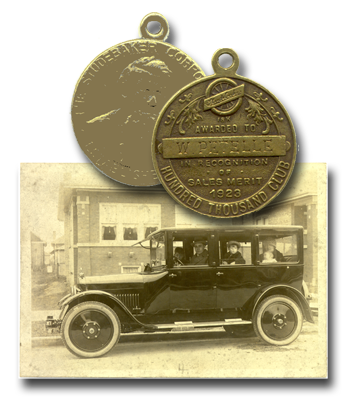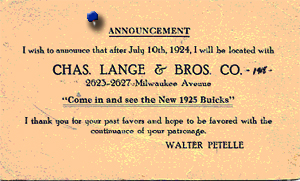A Shift in Sales.
1910's.
As the decade aged there was more brewing than just beer, resulting in a career change for our ancestor.
Walter continued his work as a peddler, or vendor, for the beer bottled in the Hansen home. The city directory in 1917 indicates he was operating out of 4336 Fullerton Avenue in Chicago. Two events would alter his course.
The first was the onset of war. The Great War began with the assassination of Archduke Franz Ferdinand of Austria on July 28, 1914, pitting the German Federation, Austria-Hungarian and Ottoman Empires against much of Europe and the Russian Empire. German naval blockades contributed to drawing the United States into the fray on April 6, 1917.
Walter, 27, registered for the draft on June 5, 1917 but was eligible to claim an exemption due to his dependents, a wife and child (son Wally was 2). The deadly conflict ended on November 11, 1918, with a legacy of having sowed the seeds of anti-German sentiment in the nation.
The second was Prohibition. To heal an ill society plagued with alcoholism, violence, and political corruption, the US Senate offered an amendment to the Constitution prohibiting the "manufacture, sale, or transportion" of alcohol in the country - though actual consumption was legal. The Eighteenth Amendment was ratified by the states and took effect January 17, 1920.
For a while they sold legal "near beer" which contained less than 0.5% alcohol. But sales plummeted. The business built by his father-in-law was in jeopardy.
Innovative Mode of Transportation.
So Walter pivoted. His early lesson in closing deals in the Chicago Board of Trade and his experience in sales with the brewery would bode well. By the 1890's people had embraced the bicycle, a new-fangled device used for transportation, negating the need for a horse and faster than walking. Indeed, his uncle Paul Pettelle was a biking enthusiast.
The idea of a horseless carriage gained traction by the turn of the century first as a novelty for wealthy patrons. Though the infrastructure was not yet available to support the new technology (gas stations, paved roads, trained mechanics, etc. were not yet in place) the public embraced the innovation.
Largely due to the efforts of Henry Ford and his Model Ts cars became affordable and by 1920 were ubiquitous. Farmers were using the new vehicles to truck their produce into cities and beer distributors delivered their wares to taverns. Sunday drives were popular after church as people could venture farther out to visit family or picnic in the countryside.
1920s.

In 1920 Marie, 27, and Walter, 29, lived in the Hansen family home with her parents, their two sons, Walter 4 years and Robert 4 months and her brother Tony. Sam Hansen was still a brewer, Tony a "trucker" and Walter was an automobile salesman for the Wm. R. Lewis Oldsmobile Motor Company.
It was the year when, for the first-time ever, women like our grandmother Marie would be allowed to vote in a Presidential election. Despite fears of upending gender roles 36 states passed the Nineteenth Amendment to the Constitution granting suffrage, or the right to vote, to women. (Republican Senator Warren G. Harding prevailed against Democratic Governor James Cox and his running mate Franklin D. Roosevelt in the Presidential election. Harding was best known for the Teapot Dome Scandal.)
Walter switched to Studebaker, working for the Northwest Sales Company. In 1923 he topped $100,000 in sales. The feat was memorialized with a bronze watch fob which he later gave to his son, our ancestor Eddy, who was born that year.

Walter became a manager for Charles Lange & Brothers Company, a Buick dealership on Clark Street, in 1925. A bittersweet year, for Marie's father Sam Hansen had died in February.
That year he took out a $1,000.00 life insurance policy to benefit his wife which reveals some personal details. A slim blue-eyed man with dark brown hair, he claims only a bout with tonsillitis which resulted in their removal in 1919. He denied any drug use, including alcohol and opium.
In addition to Woodmen of the World, Walter had followed his father-in-law's lead and joined another fraternal organization. He was a Master Mason and a member in good standing at Logan Square, Lodge No. 891. Marie had been admitted to the Order of the Eastern Star.
He moved the family to a new home in 1926 at 5544 Hutchinson, valued at $15,000, which his son, Edward, described as a "beautiful octagon front bungalow." The home was just a block from Portage Park which offered a sand-bottomed swimming lagoon. Mother-in-law Christine Hansen, widowed, lived with them; the Hansen home on Monticello was rented.
- WWI Draft Registration Card, Roll: 1503988; DraftBoard: 78: Walter Petelle
- 1920 Census - Chicago, Illinois, T625-351, page 246, 33-wd, SD 1, ED 2063, Sheet No. 1B, lines 92-98
- https://power2switch.com/blog/how-electricity-grew-up-a-brief-history-of-the-electrical-grid/index.html
- https://thisistrue.com/rural_electrification_meet_the_rural_internet/
- 1928 Polk City Directory Hutchinson [N Linder av intersects] 5544: Petelle Walter (Marie)
- All About Me, Edward Petelle, 1998
